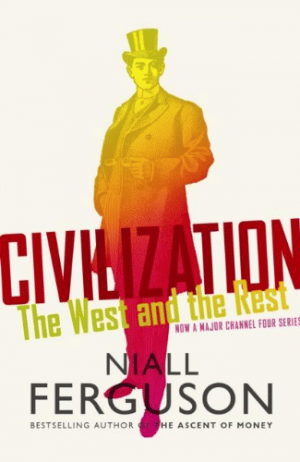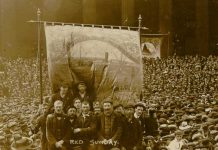Bog på dansk om “Vestens storhed”.
Linkbox om den meget produktive britiske konservative historiker Niall Ferguson og hans værker. Hans bog fra 2011 om de sidste 500 års globale historie, Civilization, er nu udgivet på dansk (Civilisation: Vesten og resten). Bogen danner også bagrund for en tv-serie, Vestens storhed (vist på DR 2014). Vi har samlet anmeldelser af bogen (de danske mest positive, bortset fra Curt Sørensen på Modkraft), samt baggrund med analyser og debat om kapitalismens oprindelse og udvikling + anden kolonialisme-debat. Desuden en række artikler, som ser kritisk på nogle af Niall Fergusons tidligere bøger: Empire: how Britain made the modern world (2003) og Colossus: the rise and fall of the American empire (2004).
Bjarne A. Frandsen, november 2014. Opdateret januar 2018

Niall Ferguson: Civilisation: Vesten og resten (Cepos, 2014, 400 sider). Forlagets site har video mv. fra boglanceringen, med indlæg/debat med Katrine Winkel Holm og Peter Fibiger Bang (1:46 min.).
“Der findes gennem historien flere civilisationer, men én af dem er de øvrige overlegen, og det er den vestlige … Bogen er et opgør med kulturrelativisme, der ikke vil tage moralsk stilling til forskellige samfundsformer … [og] er en veldokumenteret gennemgang af den vestlige civilisations fortræffeligheder.”
Indhold
- Leksikale
- På dansk
- In English
- Se også / See also
- Kritik af Niall Ferguson-bøger om kolonialisme/imperialisme
Leksikale
- Civilisation: Is the West History? (Wikipedia.org). About the 2011 British TV documentary.
- Niall Ferguson (Wikipedia.org). Med link til bl.a. kortere svensk og norsk artikel.
På dansk
Information.dk
Vestrelændinge og resterlændinge. Af Sebastian Gjerding (25. oktober 2014). “For nogle er det et usmageligt forsvar for vestlig imperialisme. For andre et tiltrængt opgør med den postkoloniale kritik af Vesten og al den skyld og skam den medførte. Den liberale tænketank CEPOS har fået oversat den kontroversielle skotske historiker Niall Fergusons værk ’Civilisation’ til dansk.”
Kristeligt Dagblad
Vesten og resten. Af Sidsel Nyholm (6. februar 2012). “Hvorfor har Europa og USA domineret verden i de sidste 500 år? … De spørgsmål gransker historikeren Niall Ferguson i en opsigtsvækkende bog.”
Modkraft.dk
Ideologisk forvridning af civilisationshistorien. Af Curt Sørensen (Kontradoxa, 2. december 2014). “Niall Fergusons bog … består af en stibe påstande. Forfatteren stiller brikker op og stiller sig i positur, men begynder regulært aldrig at spille spillet.” Artiklen er også bragt på Kritisk Debat: Sejrherrernes historie (15. december 2014).
Trykkefrihed.dk
Vesten og resten. Af Christopher Arzrouni (2. juni 2011). “Hvordan kan det være, at den vestlige verden blev en succes? Og hvad er sandsynligheden for, at den vestlige verden oplever en deroute? Det er de to centrale emner i Niall Fergusons ”Civilization – the West and the Rest.”
Weekendavisen
Gåden om Vesten – den britiske version. Af Frederik Stjernfelt (nr.14, 8. april 2011; online på Inadvendt.dk). “Et inspirende og underholdende stykke vestlig selvhævdelse — kærkomment, efter at vi i generationer har været vant til at høre intellektuelle, der nyder alle Vestens fordele, docere om Vesten som roden til alt ondt.”
In English
Al Jazeera
Disoriented: Niall Ferguson’s ‘Civilisation’. By Dan Hind (11 May 2011). “Instead of an energetic challenge to the received wisdom, we find a conceptually baggy and largely predictable canter through global history from 1500 to the present day.”
London Review of Books
Watch this man. By Pankaj Mishra (Vol.33, No.21, 3 November 2011). “To ask, as Ferguson does, why the West broke through to capitalist modernity and became the originator of globalisation is to assume that this was inevitable, and that it resulted basically from the wonderfulness of the West, not to mention the hopelessness of the East. Needless to say, most contemporary scholars of global history do not hold the West and the Rest in separate compartments.” With debates between Niall Ferguson and Pankaj Mishra.
Socialist Worker
Is the West better than the rest? (Issue 2242, 12 March 2011). “A right wing historian Niall Ferguson’s new TV series celebrates European civilisation. Andrew Stone shows how imperialism has constantly stamped on freedom, not championed it.”
Se også / See also
The great British Empire debate. By Kenan Malik (The New York Review of Books, January 26, 2018). “The latest controversy began when the Third World Quarterly, an academic journal known for its radical stance, published a paper by Bruce Gilley called ‘The Case for Colonialism’.”
Third World Quarterly row: Why some western intellectuals are trying to debrutalise colonialism. By Vijay Prashad (MR Online, September 25, 2017). “In the past decade, several prominent European and North American intellectuals, with very poor analytical skills, have produced work that seeks to overturn the consensus against colonialism.”
A quick reminder of why colonialism was bad. By Nathan J. Robinson (Current Affairs, September 14, 2017). “Ignoring or downplaying colonial atrocities is the moral equivalent of Holocaust denial… ”
Mellem civilisationshistorie og globalhistorie (Den Jyske Historiker, nr.100, februar 2003, side 12-123). Med artikler af Peter Fibiger Bang, Søren Clausen, Niels Brimnes og Rune Haahr Petersen. Kun abstract online.
Great Divergence (Wikipedia.org). “This article is about the era of dominance of Western Civilization.”
Where did capitalism come from? (Socialist Worker, Issue 2362, 16 July 2013). “Talat Ahmed looks at how the system developed the way it did in different parts of the world and argues that thhere was nothing special about the West other than accident.”
The peculiarrity of Europe. By Neil Faulkner (Counterfire, 13 February 2011). A Marxist History of the World, Part 29: “Why Europe? Why was it that the second great transformation in human existence — the development of capitalism and industrial society — was pioneered on the Western edge of the Eurasian land-mass?”
Ten years of debate of the origins of the Great Divergence. By Patrick O’Brien (Reviews in History, No.1008, November 2010). “Ten years of debate on the origins of the Great Divergence between the economies of Europe and China during the era of mercantilism and industrialization.”
The origins of capitalism (International Socialism, Issue 111, Summer 2006, p.127-162). “A discussion which took place between Chris Harman and Robert Brenner in November 2004, organised by the journals International Socialism and Historical Materialism.”
The rise of capitalism (International Socialism, Issue 102, Spring 2004, p.53-86). “Chris Harman seeks to explain why and how capitalism developed in the first place. Why did the once feudal empires of the Middle East and Japan stagnate and fall behind? How did northern Europe leap ahead of the rest of the world?”
A Marxist History of the World. By Neil Faulkner (Counterfire; Internet Archive WayBackMachine). An online edition of Faulkner’s book (Pluto Press, 2013, 342 p.).
A People’s History of the World (Socialistisk Bibliotek). Linkbox om Chris Harmans bog med anmeldelser og interview + bogen online (Bookmarks, 1999, 729 p.).
The origins of Capitalism (Marxmail.org). Texts by Louis Proyect.
Kritik af Niall Ferguson-bøger om kolonialisme/imperialisme
Boston Review
The good Empire. By Vivek Chibber (February 1, 2005, p.30-34). “Colossus is a short book that makes many claims. In assessing them, we need to ask two main questions. First, are the claims true? In particular, was British rule basically about sound governance and the building blocks of democracy? And second, if they are true — if colonialism did have the beneficial outcomes Ferguson attributes to it.”
International Socialist Review
When Brittania waived the rules. By Paul D’Amato (Issue 23, November-December 2003). “Niall Ferguson’s new book Empire (a companion to a British Channel Four television series), oozes, to quote Marx, the ‘evil intent of apologetics’.”
Logos: A Journal of Modern Society & Culture
I’m ok, you’re ok. By Robin Melville (Vol.2, No.4, Fall 2003; online at Internet Archive). “Ferguson’s book must be seen as an attempt to discourage misgivings, to discourage soul-searching, to move the ongoing American debate in a thoroughly pro-imperialistic direction, and to discourage opposition to a violence-based formal empire in the United States, in Britain and elsewhere.” Review of Niall Ferguson’s book Empire.
Middle East Report
The imperial lament. By Joel Beinin (June 2004). “His principal point is that the United States, like Great Britain before it, should be an empire and that the world badly needs the US to behave like one.” Review of Niall Ferguson’s book Colossus.
New Left Review
Imperial margarine. By Robin Blackburn (Issue 35, September-October 2005). “Written as if to teach us statesmen and citizens how to be good imperialists, they have become bestsellers, and an obligatory reference point in debates on empire.” Review of Niall Ferguson’s books, Empire and Colossus.
OpenDemocracy
An Oxford Scot at the King Dubya’s court. By Stephen Howe (23 December 2012). “Is America an empire? Should it be? With Washington appointing its proconsul to rule Mesopotamia the book was a powerful treatment of a highly topical issue, first published on 22 July 2004.” Review Nial Ferguson’s book Colossus.
Radikal Portal
En ideologisk kriger prøver å restaurere imperialismen. Av Vegard Velle (18.06.2015). “Civita er den høyrevridde tenketanken som synes det er på tide å overlate scenen til den britiske historikeren Niall Ferguson, en mann som synes det er synd britene ikke holdt fast ved imperiet.”
Socialist Review
End of Empire: spectre of defeat. By Alex Callinicos (July-August 2004). “In singing the praises of what he calls ‘imperialist globalisation’ Ferguson has to skate over some thin ice.” Review of Niall Ferguson’s book Empire.
Capital and conquest (February 2003). “Niall Ferguson’s new television series, together with the accompanying book Empire: Chris Bambery recalls the brutal history of the British empire.”
Socialist Worker
No defence for the British empire. By Neil Davidson (Issue 2006, 24 June 2006). “Niall Ferguson presented the first episode of his television series The War of the World this week. His apology for imperialism must be robustly challenged.”
Spiked
A miserabilist history of the twentieth century. By James Heartfield (29 June 2006). “Niall Ferguson’s War of the World is shot through with a negative view of progress and some dubious socio-biological thinking.”
Weekly Worker
In the interests of freedom (Issue 532, 10 June 2004). John Davidson reviews Niall Ferguson’s American Colossus: “I can only hope that not too many people wasted a whole two hours watching this programme: its political statement was based on that worst of all ‘controversial’ viewpoints — an attack on the US government from the right.
World Socialist Web Site
What price an American empire?, Part 1. By Ann Talbot (7 December 2004) + Part 2 (8 December) + Part 3 (9 December). “All British historians, E.H. Carr once said, are Whigs, even the Tories — but not in Niall Ferguson’s case. He is a Tory formed in the Thatcherite mould, who cut his teeth writing for Daily Telegraph while he was a research student in Germany. He is also one of the most prolific historians working today.”


































